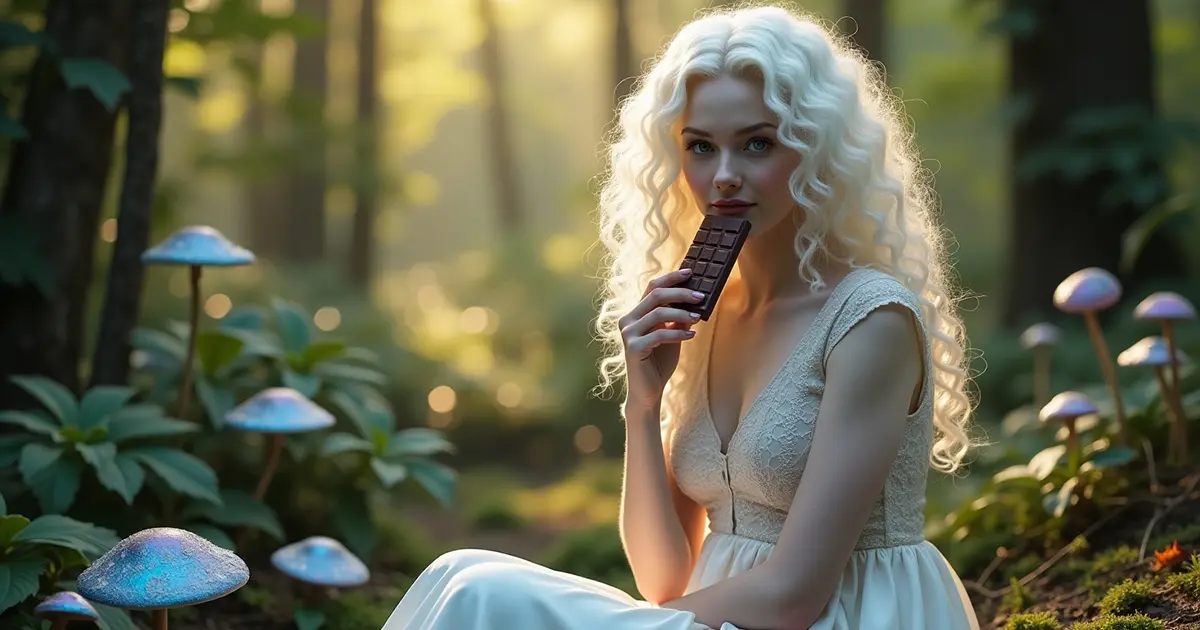Blog
Shroom Chocolate: How Psilocybin Meets Sweet Treats

If there’s one culinary mash-up that sparks curiosity, it’s the marriage of psilocybin’s long, storied cultural history with the irresistible comfort of chocolate. Whether you’ve heard friends mention “mushroom chocolate,” scrolled past an Instagram post about “shroom chocolate” bars, or are Googling “psilocybin chocolate” out of pure curiosity — this guide breaks it all down. We’ll cover what people mean by mushroom chocolate, the difference between psychedelic and functional mushroom confections, the science and safety considerations, legal realities in the U.S., and where to look for legal, high-quality chocolate shroom alternatives. If you’re here for a tasteful primer, you’re in the right place.
What Is Shroom Chocolate (And Why Is It A Thing)?
“Shroom chocolate” or “mushroom chocolate” usually refers to chocolate that has been combined with mushrooms. That umbrella covers two very different products:
- Psilocybin chocolate / magic mushroom chocolate — chocolate infused with psilocybin mushrooms (the psychoactive “magic mushrooms”), designed to produce psychedelic effects. People sometimes call these magic mushroom chocolate or psilocybin chocolate.
- Functional mushroom chocolate (legal) — chocolate infused with legal, non-psychedelic medicinal mushrooms such as lion’s mane, reishi, cordyceps, or chaga. These are often marketed for focus, relaxation, or general wellness and are legal and widely available.
Because chocolate masks earthy flavors and helps portion out doses, it became a popular vehicle for both categories. But the experience, legal status, and safety profile between a psilocybin chocolate and a functional mushroom chocolate bar are night and day — so it’s important to know which one you’re talking about.
A Brief History: Chocolate And Mushrooms, Cultures Collide
Humans have paired fungi and cacao for centuries in separate cultural contexts. Indigenous cultures in Mesoamerica revered cacao; other communities around the world used psychoactive fungi in ritual settings. The modern idea of a chocolate-based delivery for psychedelics likely emerged from the simple logic that chocolate is tasty, portable, and can hide the strong taste of mushrooms.
In recent years, growing mainstream interest in psychedelic research and the rise of boutique edibles have pushed “magic mushroom chocolate” from niche to newsworthy. At the same time, CBD and functional mushroom products exploded in popularity — and chocolate bars became an elegant, consumer-friendly format for those ingredients too.

How Psilocybin And Chocolate Interact (The Science In Plain English)
Psilocybin is a prodrug — when ingested, the body converts it into psilocin, which acts on serotonin receptors (notably 5-HT2A) in the brain. That interaction alters perception, mood, and cognition in ways that can lead to profound subjective experiences.
Chocolate doesn’t change the fundamental pharmacology of psilocybin, but it can influence onset and experience in a few practical ways:
- Chocolate slows digestion slightly compared with taking dried mushrooms on an empty stomach, which can smooth the onset of effects.
- The fat content in chocolate may help absorption of some compounds and makes a chocolate delivery convenient and palatable.
- Chocolate’s sensory appeal — aroma, texture, sweetness — can shape the psychological set (expectation) and setting (environment), both crucial determinants of a psychedelic experience.
This synergy explains why people favor chocolate as a vehicle — but it’s not an endorsement. Psychedelic experiences can be intense, and combining them with a pleasurable medium like chocolate can make one underestimate the seriousness of dose and context.
(For readers interested in the clinical side: modern institutes such as Johns Hopkins are leading controlled research into psilocybin’s therapeutic potential, exploring applications for depression, addiction, and end-of-life distress.)
Forms: From Artisanal Squares To Microdose Bites
If you search for “mushroom chocolate bars,” you’ll find a few product categories:
- Artisanal psilocybin chocolate: Handcrafted bars or bites that contain measured doses of psilocybin. These are typically sold in places where psilocybin is legal under specific programs — not everywhere.
- Microdose chocolate: Very low-dose chocolates (often marketed for subtle mood or creativity boosts). Microdosing trends exist primarily in informal markets and should be approached cautiously.
- Functional mushroom chocolate bars: Legally sold in most states and online; these use non-psychedelic mushroom extracts like lion’s mane (memory/focus), reishi (calm), or cordyceps (energy). They are safe, legal, and a sensible alternative for someone who wants “mushroom chocolate” without the psychedelic effects.
Because labels can be confusing, always read ingredient lists carefully and verify whether the product contains psilocybin (psychoactive) or legal mushroom extracts.
Benefits People Talk About — And The Evidence
Advocates for psilocybin report profound shifts in mood, perspective, and well-being after guided sessions; clinical studies also show promising therapeutic effects in controlled settings. For example, leading research centers are studying psilocybin in the treatment of depression and other conditions. At the same time, legal, functional mushroom chocolate bars are commonly promoted for more modest wellness benefits (focus, sleep support) backed by differing levels of scientific evidence depending on the mushroom species.
Important: Most rigorous clinical results for psilocybin come from controlled therapeutic settings with screening, guidance, and follow-up — not from recreational use. The context, dosage, and preparation used in clinical trials differ greatly from casual, unsupervised consumption.
Risks, Safety, And Harm Reduction (Don’t Skip This)
Psychedelics are not inherently “safe” just because they’re natural. Key safety points:
- Set and setting matter. An unsupervised or poorly prepared environment can increase the risk of a difficult or traumatic experience.
- Psychological risks. People with personal or family histories of psychosis, bipolar disorder, or severe untreated psychiatric conditions should avoid psilocybin unless under specialist supervision.
- Dose clarity. Dosing inconsistencies are a real risk in informal products. A poorly labeled “chocolate shrooms” bar could deliver more psilocybin than intended.
- Interactions. Psilocybin can interact with prescribed medications (SSRIs, certain MAO inhibitors, etc.). Always consult a healthcare professional.
- Legality and criminal risk. In many places, possessing or distributing psilocybin is illegal — more on that below.
If someone is considering a psychedelic experience, harm reduction best practices include research, mental health screening, test dosing in trusted settings, having a sober trip sitter, and avoiding mixing with alcohol or other substances.
The Legal Landscape In The U.S.: It’s Complicated (And Changing)
Psilocybin is still illegal under federal law in the United States, but a patchwork of city and state policies has created pockets of legal access or decriminalization. Most notably:
- Oregon created a regulated psilocybin services program (Measure 109) that tasks the Oregon Health Authority with licensing services, manufacturing, and delivery under a therapeutic model. That program represents one of the first statewide regulatory approaches.
- Colorado voters approved a measure (Prop 122 / related acts) to decriminalize certain psychedelic plants and create a regulated access program; regulators have been developing rules and timelines for supervised services.
Beyond those examples, local decriminalization efforts (e.g., city-level initiatives) and evolving state legislation mean the legal picture varies widely. Always check authoritative, up-to-date sources for your specific state or city before considering possession or purchase. (A useful law-and-policy tracker from several university and research groups maps these changes.)
Why Many Sites Offer “Mushroom Chocolate Bars” That Aren’t Psychedelic
Because psilocybin remains federally illegal, many reputable online cannabis retailers and dispensaries market functional mushroom chocolate bars instead — edible chocolate that contains legal mushroom extracts (lion’s mane, reishi, etc.) or cannabinoids like CBD. These products let customers enjoy the wellness trend without legal or safety hazards. If you want a mushroom-flavored chocolate experience that’s legal and low-risk, these are the bars to try.

Responsible Shopping: What To Look For When Buying Mushroom Chocolate
If you’re shopping for legal mushroom chocolate or browsing “chocolate shrooms” themed edibles, look for:
- Clear ingredient lists that specify whether the product contains psilocybin or legal mushroom extracts.
- Third-party testing and certificates (COA) for potency and contaminants — especially important for functional mushroom extracts and cannabis edibles.
- Transparent dosing — especially for any product labelling psychoactive contents.
- Reputable vendors with clear return and customer service policies.
- Legal disclaimers and compliance info for your state.
And if you ever encounter a product that claims to contain psilocybin and ships to states where it’s illegal — that’s a red flag. Avoid it. You can find safe, legal mushroom chocolate bars and cannabis-infused chocolates through licensed retailers in jurisdictions where those products are permitted.
The Research Front: Why Scientists Are Paying Attention
Academic and medical institutions have reinvigorated psilocybin research over the last decade. Studies suggest potential benefit for treatment-resistant depression, addiction, end-of-life anxiety, and other conditions when psilocybin is administered in controlled therapeutic settings. Governments and regulators have started to respond — the FDA has previously granted Breakthrough Therapy designation to certain investigational psilocybin therapies, reflecting interest in streamlining development where data look promising. However, regulatory milestones are not the same as general legalization.
Alternatives: Enjoy The Mushroom Chocolate Trend Legally
If you want the experience or vibe of “mushroom chocolate” without legal or safety headaches, try:
- Functional mushroom chocolate bars (lion’s mane for focus; reishi for calm).
- Cannabis-infused chocolates where legal — many reputable dispensaries sell microdosed shroom gummies and chocolate squares.
- Cacao + mushroom blends where the mushrooms are adaptogenic or culinary (chaga, cordyceps), not psychedelic.
These are widely available and are an excellent starting point for consumers curious about the flavor and ritual of mushroom chocolates without involving psilocybin.
Final Thoughts: Curiosity + Caution
“Mushroom chocolate” and “shroom chocolate” capture two very different consumer paths: one recreational/therapeutic and tightly regulated (psilocybin chocolate), the other legal and mainstream (functional mushroom or cannabis chocolates). If you’re curious about magic mushroom chocolate or psilocybin chocolate, do your homework: learn the law in your state, read the science, and prioritize safety and reliable vendors. If you want the mushroom-chocolate aesthetic or mild wellness benefits without legal risk, legal mushroom chocolate bars and cannabis edibles are a great, lower-risk choice.
Ready to explore legal, high-quality options? If you’re shopping for mushroom chocolate bars that use legal mushroom extracts or looking for cannabis chocolates available in your state, check out Get Bud Online for a curated selection of tested, compliant products and helpful product descriptions to match your needs. Always verify local laws and product lab testing before you buy.
Note: This post is for informational purposes only. It does not endorse illegal activity. Laws and regulations around psilocybin are changing rapidly — consult official state resources and qualified medical professionals before making health or legal decisions.
REFERENCES:
Oregon Health Authority. (nd). Oregon Psilocybin Services. Available at: https://www.oregon.gov/oha/PH/PREVENTIONWELLNESS/Pages/Oregon-Psilocybin-Services.aspx
Swallow, O. (2024, December 6). State-regulated Psychedelic Therapy Program Set to Launch in Colorado in 2025. Available at: https://coloradotimesrecorder.com/2024/12/state-regulated-psychedelic-therapy-program-set-to-launch-in-colorado-in-2025/66285/
